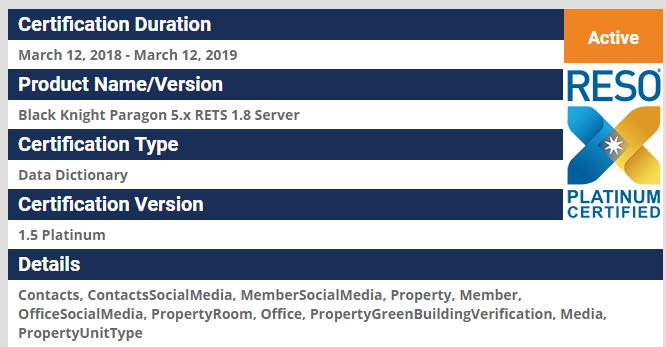RESO or the Real Estate Standards Organization provides developers with a means to build faster, accurate, and more scalable technology for all their real estate customers, big or small.
MLSs around the United States and Canada are conforming to RESO standards, thus making it easier for developers and agencies to develop products and offer services that are in sync with real estate market standards unified through RESO.
Real estate brokers, as well as their clients, have a growing demand for seamless technology, and this is how RESO helps make that possible.
Benefits of being a RESO Partner
- As MLS, it’s a great advantage to be a RESO member because you will have the opportunity to be a part of the decision process in the field of real estate standardization.
- You can build faster, quickly integrable tools – with the RESO standards for your MLS members. RESO offers different technological solutions to increase efficiency for consumers, agents, brokers, and MLSs alike. Products built with RESO standards in mind can be scaled quickly and more comfortably than ever before.
- RESO partners have a more significant competitive advantage by being the first to implement this technology, which is the future of IDX.
- RESO members include leading real estate personalities. Conference and meetings provide RESO partners with networking opportunities with the most prominent players in the real estate industry.
What is RESO Web API
The RESO Web API is the ultimate way to transfer data between the different players in the real estate industry. And RESO Web API is what MLS Import uses to add listings from your MLS to your WordPress Real Estate theme.
This API is built on shared, open technology standards, making it easier for any organization, such as real estate brokerages, MLSs, and website developers, at the same time to receive and deliver data more effectively and much faster than ever before.
Both end-consumers, as well as real estate brokers, have a better experience with the adoption of the RESO Web API.
Protocols and standards such as OAuth and OData are the core of the RESO API’s functionality.
This technology has excellent support for the future, so both developers and agencies can rest assured that they have the help they need to finish any real estate project.
If you choose to build your IDX website with MLS Import, you are sure to have access to the latest technology in how MLS data is transferred from MLS to your site.
About RESO Certification
RESO offers certifications that ensure different organizations comply with RESO real estate standards.
As such, RESO certifications are a badge of honor for entities within the real estate industry, brokerages and developers alike can rest assured that the technology they use is interoperable with other MLS systems.
By getting certified, you can ensure that your real estate website will provide customers and partners with a great experience.
All customers want seamless inter-connectivity between the different real estate apps, websites, and servers you will develop and manage.
RESO standards provide the universal language that makes it possible.
MLSs operated by REALTOR associations are required by the National Association of REALTORS to apply the RESO standards within a year after RESO implements a new standard.
MLSs not owned or managed by REALTOR associations can also implement RESO standards, thus making the real estate industry more efficient.
MLS Import Plugins works with all the 650+ MLS that have the RESO Certification.
Getting Certified
The certification process is simple and easy to follow.
Applying & Verification
You will have to apply for certification through the RESO website. The direct link is here.
System Testing
The applicant will provide RESO specialists with credentials to test the website or system currently in development.
Troubleshooting & Certification
Applicants who pass the tests receive their certificates from RESO. The applicants who do not pass the initial testing phase get guidance from the RESO staff on how to overcome any issues. The website/system gets retested before receiving the certification.
Standard RESO API Terms:
Authentication
Identifies the entity that is requesting data. All APIs will have to authenticate who is seeking a particular piece of data and determine which data they are authorized to access.
Authorization
Identifies the types of data an individual user is allowed to access. When accessing data through an API, the user supplies an authorization code (also called an API key) — the API key sets which types of data the user is allowed to see.
API
Application Programming Interface or API for short is a set of rules and ways by which different technologies and apps can interact with each other. The API is an interface for the delivery of data.
Endpoint
Represents the specific web address where certain data can be accessed. An API may have one or more parameters from where you get multiple types of data.
HTTP
Hypertext Transfer Protocol or HTTP represents a set of rules for transferring data between different systems on the web or within a private network.
OData
A set of rules related to building and transferring data through an API. RESO currently uses OData V4.
OAuth
Represents the open standard that allows authorization and authentication in just one step. Users who were previously identified by the system are also able to login to other APIs and gain quicker access to services.
JSON
Used for data representation that is simple to interpret, thereby increasing ease of use.
Metadata
Serves as an overall guide on what data is available to the end-user and how it’s structured. Metadata can also be analyzed before delivery so that users will have a preview of the data accessed through an API.
Payload
This is a set of data arranged within a structure. For example, the IDX Payload includes all fields related to a real estate IDX website in a format that is easy to view by the end-user.
Protocol
A set of rules or a specific process.
Replication
Refers to the process of copying databases. This is done by initially copying the entire database and then continually copying the most recent data changes to update the replicated database. As such, both databases synchronize.
REST
Representational State Transfer or REST, for short, is a system used to create APIs that communicate efficiently between different systems. REST APIs use HTTP requests to delete, update, or input information.
Table of Contents





